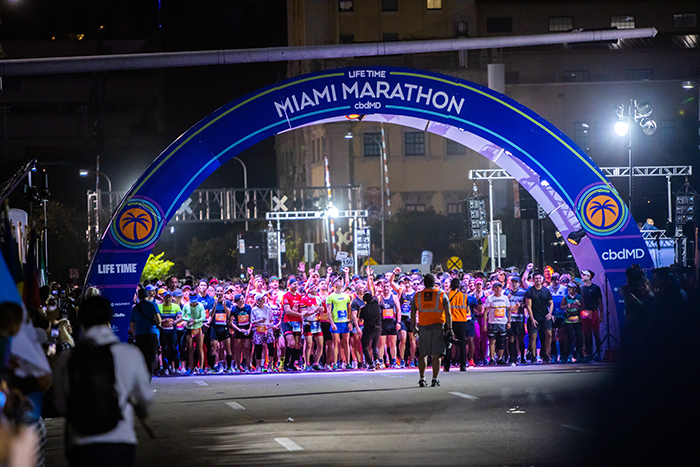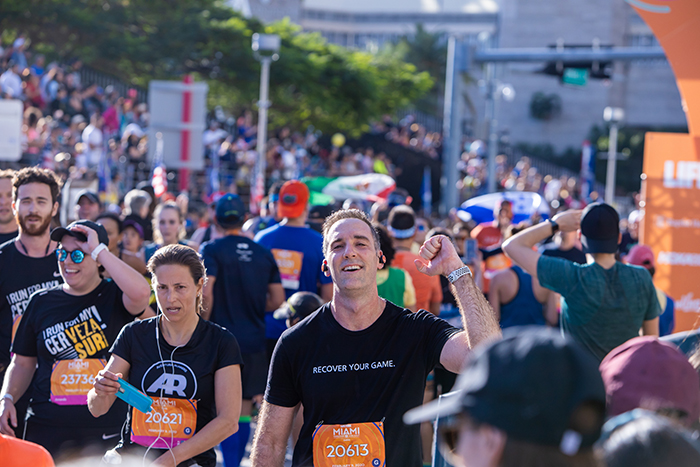Half Marathon Training Tips from Sports Medicine Expert

Most doctors will tell you how good running is for both your physical and mental health, including these two physicians with the University of Miami Sports Medicine Institute. But, they don’t just talk the talk, they also … run the run. For the past several months, they trained for the Miami Half Marathon, and they say you can do it, too.
Drs. Michael Baraga and Stephen Noel Henry have years of sports medicine expertise and personal experience with long-distance running, so who could be better to ask for marathon training advice?
The starting line
Even the most avid runner needs to have a plan if they are going to conquer the 13.1 miles in a half marathon. In fact, even though Dr. Henry has been running since he was 18 and has participated in shorter distance races, this was his first attempt at a half marathon. He began training 12 weeks ago and followed the recommendations of the American College of Sports Medicine (ACSM).
“For anyone who’s thinking about doing a marathon, some of the basic things you need to consider are the dates of the event, the location, typical weather, and what time of day your race is going to take place,” says Dr. Henry.
While working toward his third half marathon, Dr. Baraga’s invoked lessons learned from the first two. “The first one, I didn’t really train appropriately; I would just run with a friend of mine,” he says. “That sort of training regimen wasn’t very structured; it was marred by overuse injuries.”
The ACSM suggests when making a training plan, you should also consider:
- Your goal – are you going to complete or compete (try to get to the finish line first)?
- Your current weekly distance and the length of your last run
- Your experience as a runner
- How long have you been training
- Your fitness level
Base building, sharpening, and tapering
Dr. Henry describes his training regimen as having three phases, the first of which is known as “building your base.” He started with a three-mile run and did that twice a week, and then once a week, he did a five-mile run.
“Phase two is where I start to sharpen my run,” he says. “I run three miles on Monday, five miles on Wednesday and another three on Friday. And then I do my long run on say Saturday.” This is when he also focused on increasing his speed a little more with each run. “When I started running, I was at a 16-minute mile, which is very slow. I’ve been able to get down to a 10-minute mile,” he says,
During the last phase of marathon training, you decrease the amount that you run in order to allow your body to rest and recover before your race. According to the ACSM, someone attempting a marathon for the first time will begin taper about 14 to 20 days before the big day. You should decrease mileage by 25% the first week, then another 25% the second week, followed by a few days of rest.
Listen to your body
Both doctors emphasized paying attention to your body. For Dr. Baraga, who was recovering from surgery on his Achilles tendon, this was particularly important. He says that listening to his body was one of the main things he tried to do differently this time. “You go out on the run, and you’re supposed to get six miles in, but at mile four, you start feeling a sharp pain in one of the muscles. You think you can push through, but then it starts hitting you a little bit harder,” he says. “11 years ago, I would’ve kept on running.”
This year when that happened, he stopped and modified his activities for a week until things got better. “More importantly, I didn’t make anything worse,” he says. “And, I was able to resume training without losing much by adding the components of cross-training and doing activities that could keep me active but not necessarily caused the same pain.”

Going the distance
Many marathoners go through “burnout” when they are training, which often causes a lack of energy and motivation. It can be exacerbated by the stress of having to balance training with other life responsibilities. Dr. Henry says that sports medicine professionals can help you through burnout and that they are not just there to treat physical injuries.
“You need someone that is either training with you or someone who has done it before so he can tell you some of the signs and symptoms of what we call the burnout,” says Dr. Henry. “Cause we all get super excited in the beginning, and then at the halfway point, either you’re tired of running or it doesn’t give you that much joy.”
Sports medicine teams can also help guide someone who has recently been injured or has undergone surgery train for a marathon and get to the finish line safely. In fact, Dr. Baraga was able to benefit from the great professionals on his own team personally.
When he finally completed the Miami half marathon after years of not running and ankle surgery, he made sure to thank them. “It’s been 11 years since I last ran this course and over six since I was last able to run at all, so it was a surreal moment not only to be able to cross the finish line but share the experience with my family,” he says. “A special thank you to Alexyz Milian and University of Miami Physical Therapy for helping me get there!”
Natasha Bright is a contributing writer for UHealth’s news service.
Tags: Boston Marathon, Dr. Michael Baraga, Dr. Stephen Henry, Sports Medicine Institute
